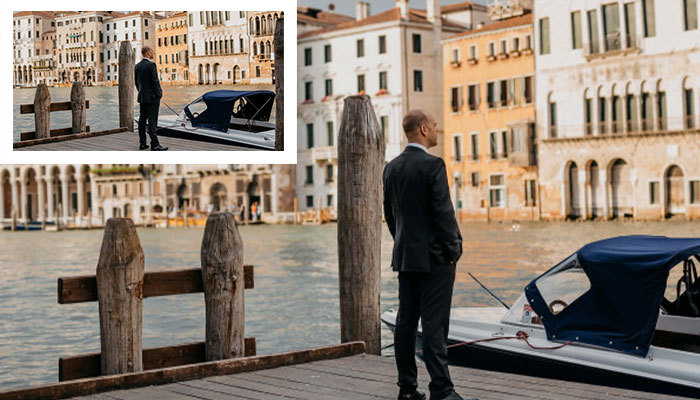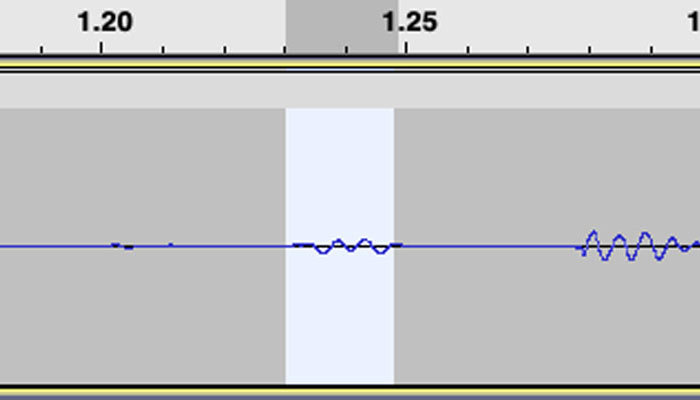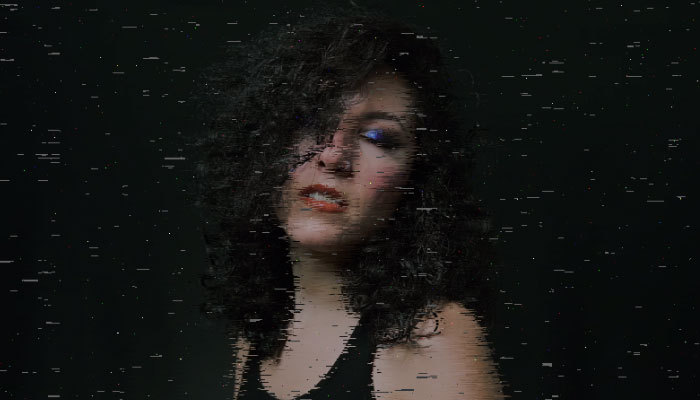Today on Art of the Cut, Billy Fox, ACE discusses editing Devotion - the dramatic film about the first black naval pilot during the Korean War.
Billy has been on Art of the Cut in the past to discuss Only the Brave, Dolemite is my Name, and Straight Outta Compton. Other features include Hustle and Flow, Coming 2 America, and Footloose. TV series include FBI, Chicago Fire, Law and Order, Band of Brothers and let’s not forget Pee-Wee’s Playhouse!
Billy Fox Discusses Editing Devotion
Let’s talk about building that opening - leading into the locker room discussion.FOX: It was a process. It's really wonderful when you can lay out all of your key characters, and get to know them and understand who they are. There were actually a couple of beats that we cut out - actual scenes - but we felt we needed to get into the guys quicker.
Ultimately, when Jesse comes in for that initial meeting between Tom and Jesse, and then the rest of the boys come in, it's wonderful making sure everyone is established. You see a little bit of personality, a little character. You start to get to know them. It took a lot of doing, but it was shot beautifully.
It's interesting that you felt that clock ticking.FOX: For me until you have a beginning, middle, and an end, it's just throwing things in. Once you've got this mass of clay, then you start shaping and you start manipulating.
When we got to that place, and the boys were all there, just keeping them all alive was hard to a certain extent because you've got, at that point two over there, two here - so it's a lot of people around the room to keep alive, and make it organic. Not that any of the shots feel like you're forcing it in, but that they're all involved and you see a little glow, finding those little beats that you have to dig out, but they pay off in the long run.
Tightening up that section before you get to the guys in the locker room - that stayed the way it was for a while? Months maybe before you realized that some things had to go?FOX: Not really. I did my first pass on it, and then had a cut that I was pretty happy with. Then JD and I worked on it for a while, and once we got a cut that we liked, largely it stayed the same.
What did you find you have to temp with?FOX: This film was entirely different than what I'm used to. I often times do a temp score and I love doing that and I love finding the right voice of what the music should be. I enjoy that process.
In this particular case, the director JD had already selected his composer. So we did have some temp music, but very little. She was starting right at the top, and looking at cut scenes, and writing scores for the appropriate scene. The score would change and it would morph and it would become more what JD had wanted. When we did our first preview, I think we had one temp cue in that she just couldn't quite get to in time.
I've heard of a couple of editors who are able to never deal with temp score.FOX: I've never had it quite this early.
I'm used to, as is often the case, the composer's not even hardly selected until you pretty much lock picture, and then you fall into that terrible realm of temp love, and that you have cues that just work even though you know you're gonna change it. And of course you can't use it, that's all fine, but you get so connected to it that when you hear the real deal, it's not as great. It doesn't hit the places that it used to hit. That's oftentimes why composers don't want to even hear what you had.
The flight footage and the VFX stuff, how did you deal with that? Did you have previs to deal with? Were you putting in shots from other movies?FOX: We had no shots from other movies. We had an entire aerial unit. The movie was shot back in Savannah, Georgia, but we had an aerial unit in central Washington State in January when all the snow was out there, that we needed to shoot for when the movie is in Korea with all the snow.
The aerial unit was three or four Corsairs, helicopters, and real MiG fighters. They would shoot two sorties a day. And, we did this virtually for months.It was a huge undertaking.
I would come in the morning, I would go to my assistant Russell and say, “So how much dailies did we get from A unit?” And he would say, “Oh yeah, you got two and a half, three hours.” “Okay, great. How much from the aerial?” “17 hours.” Because there would be six cameras on the plane and they would go up twice. It was so much footage.
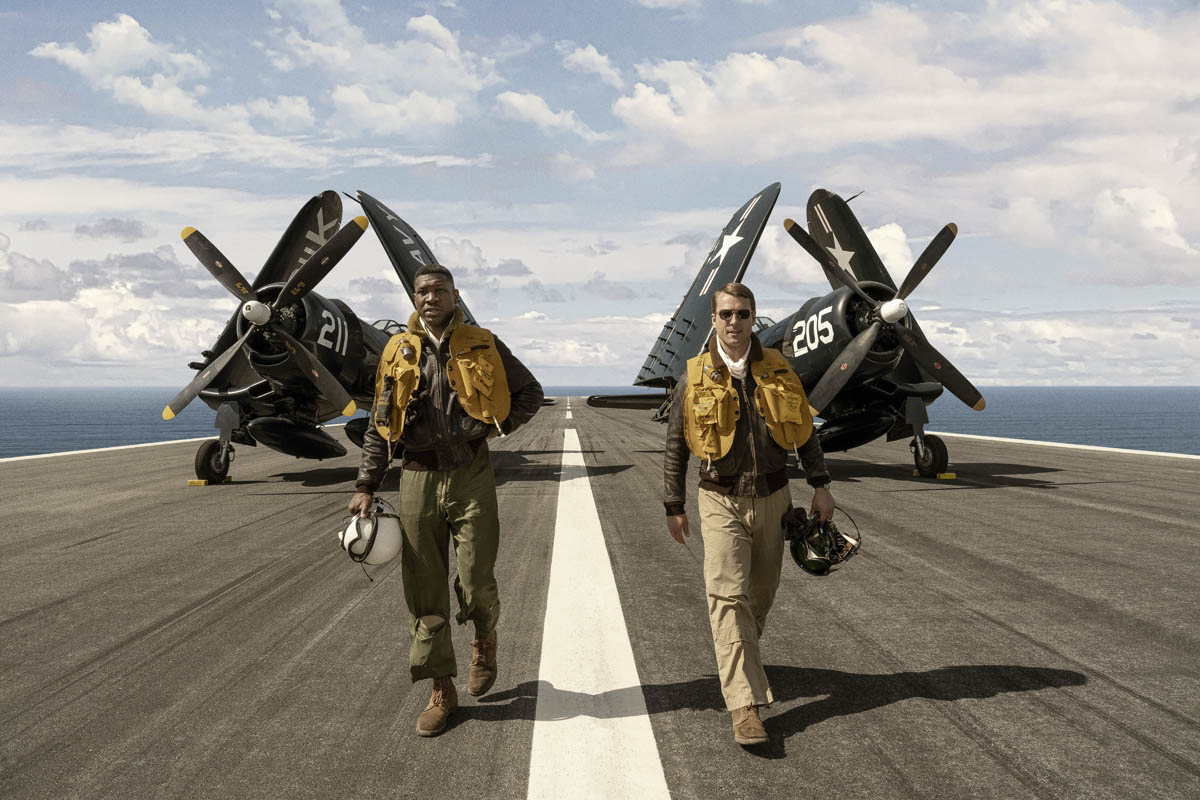 The image was oftentimes supposed to be six planes wide but I only really had three. So I took the line drawings of one of the planes from the storyboards, and I would literally key it in because the shot was framed with room for the additional three planes. Then I would put in this hand-drawn plane and track it. It worked so well. So we went through this process where everything was storyboarded in terms of all of the sequences - that right here, this plane peels off this way and in the next shot, this plane does this - it's all storyboarded.
The image was oftentimes supposed to be six planes wide but I only really had three. So I took the line drawings of one of the planes from the storyboards, and I would literally key it in because the shot was framed with room for the additional three planes. Then I would put in this hand-drawn plane and track it. It worked so well. So we went through this process where everything was storyboarded in terms of all of the sequences - that right here, this plane peels off this way and in the next shot, this plane does this - it's all storyboarded.
So we had so many options for every storyboard chunk. Then there was what we would call a ‘non boarded,’ where a plane would do an amazing turn or a this or a that. We were always pulling out ‘non boarded’ shots. It was a tremendous amount of footage to sift through, but we pretty much had everything we wanted.
Most everything in the movie is real. There's an additional plane added or two or three, but the principal planes were almost all real. DNEG did our visual effects and they basically got to a place where you could not tell the difference between the real plane and the fake plane, which is moving.
It’s very hard to do something as simple as having two planes moving around. You’d think it’s easy, but to make the motion look real, to have two planes that are married, but they would never be married. They’re always moving on their plane.
It's interesting though, that you had the actual footage. I'm sure that affected you instead of looking at previs, for example.FOX: I would slug in the previs until I could really find the shot that we needed. There were a couple of sequences where they were landing on the aircraft carrier where I didn’t have a good portion of those shots. So I used my hand-drawn plane out in the distance - when the plane is coming in, there's no plane back there.
So I had my little plane out there, I would move it and track it. It did what it was supposed to do. And then of course, DNEG would replace it and it was great.
You were cutting in Premiere, correct?FOX: Yeah, it was great. We had a great time. Being that it was during Covid, Russell, my first (assistant editor), and then JD, weren’t in the same room until… I don't wanna say a year in, but it was like seven months later. In fact, Russell and I had never met in person.
How much actual interaction do you need to have with your assistants?FOX: A fair amount. We were constantly talking and asking for this or saying, “What's the status of that?”
We were using Lucid Link as the means by which we were syncing our projects together. Each location had dailies locally, but syncing the project was done through Lucid and we were doing that for a while. We weren't using Evercast at that stage that much. But every time I needed to talk to Russell, I'd have to call him or I'd have to text him or I'd have to FaceTime him or whatever and it was a big pain in the butt.
So he hooked up Discord for us. He designated a button on my keyboard so whenever I needed to talk to Russell, I'd hit the button and go, “Hey Russell, when do we get that?” Or, “what's the status on this?” And he would hit me back. That actually completely changed how efficient we were. It really was as if we were in the same facility.
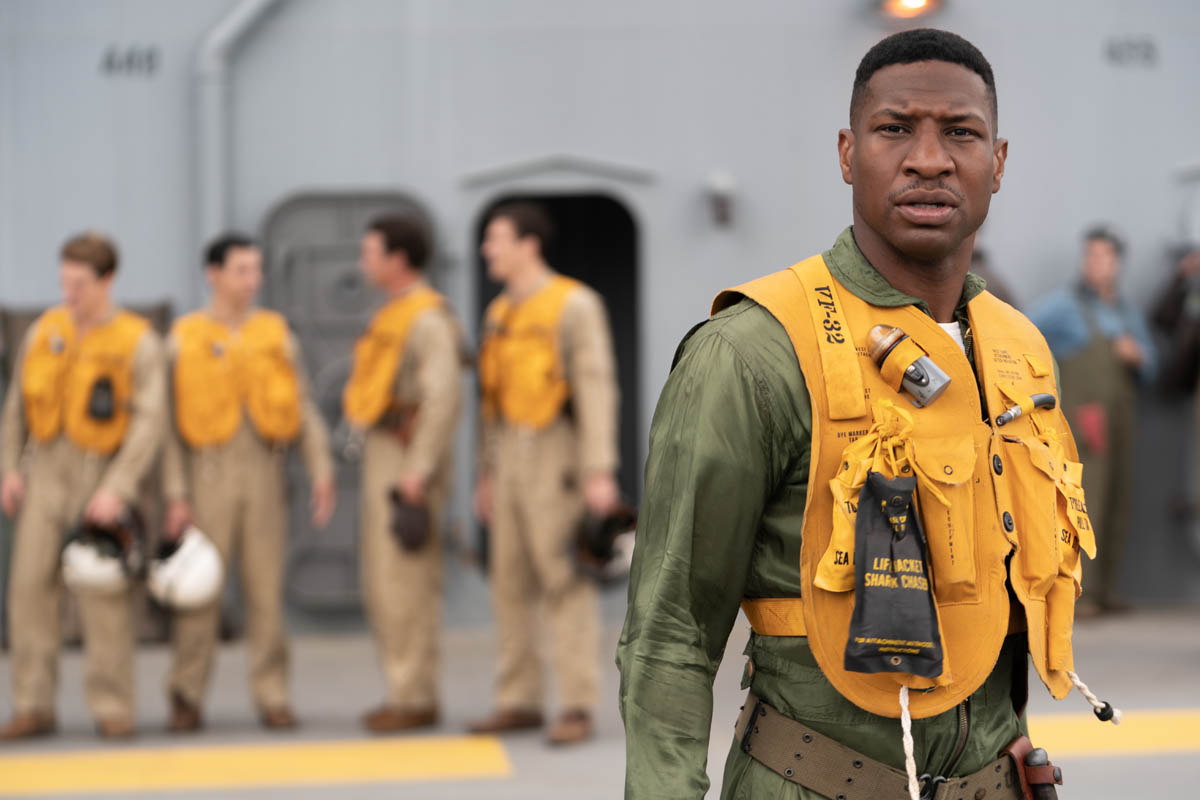 That's really interesting. Remote workflow and assistant workflow.
That's really interesting. Remote workflow and assistant workflow.
FOX: It was as efficient as you could be.
I think down the road I would like to look into cloud-based media but he had also written software so that as dailies came into him, it was automatically updating to my drive in the background. I never knew it was happening. I could see that the drive was hitting. I could see that it was happening, but it was always backing up. It was always updating if someone else - one of the other assistants or music or whatever - was adding stuff to our system, it was pushing out to me automatically. So within a couple of minutes I was in sync. Everyone was always being updated and worked seamlessly.
Did you work in Adobe Productions?FOX: Yeah. We were the first one to use it on Only The Brave. It worked great. It was the first version and it had some kinks in it. But it's just gotten better and better. It's very similar to Avid - bins are locked - and it works just great.
Do you notice a difference in the speed or the stability of Premiere since Productions? Because film projects can just get to be huge.FOX: No, if I need something or I need him to release a reel, and even when we're using Lucid or if it's local and I say, “Can you release reel two?” I just look down, there's a little lock on it. Then boom, virtually instantly it disappears.
Thing of interest too: I had never used Evercast before. So when JD and I started the director's cut, I was intrigued to see if this was efficient. Would it be frustrating? Am I gonna be able to stay up to what I'm normally used to? What's gonna be like?
Very long story short, it was great. It was weird. You had JD on a monitor over here, and then I had my edit system here, and we're just talking. I think the only negative is that I have to wear headsets, but that was fine.
.jpg) I've talked to other people about Evercast and they say it's weird because you're looking at your director face-to-face instead of having him someplace else - side-by-side for example, or sitting behind you.
I've talked to other people about Evercast and they say it's weird because you're looking at your director face-to-face instead of having him someplace else - side-by-side for example, or sitting behind you.
FOX: In fact, I did that. I had my monitors here in front of me, and I had JD on a monitor over where the chair is that a director would normally be sitting.
So when we would have a conversation, if I talked to him, he’s looking at the side of my face. So then I moved the camera over there to be along with his monitor. So when I would want to talk to him, I would just do that. It made it nice. It’s different, but it’s fine.
That’s monitor placement for an Evercast session. You do it the way you’re used to, which is ‘he’s usually sitting on this side of me’, so I’m going to put the monitor and the camera there.FOX: It made it real.
One of the things I love talking about is this idea of how important it is to set up the characters and set up that you care about them. Talk to me about balancing the amount of time you take to set up characters, build the fact that the audience cares about them, but we gotta get to the airplane stuff, we gotta get to the action, we gotta get to the core of this.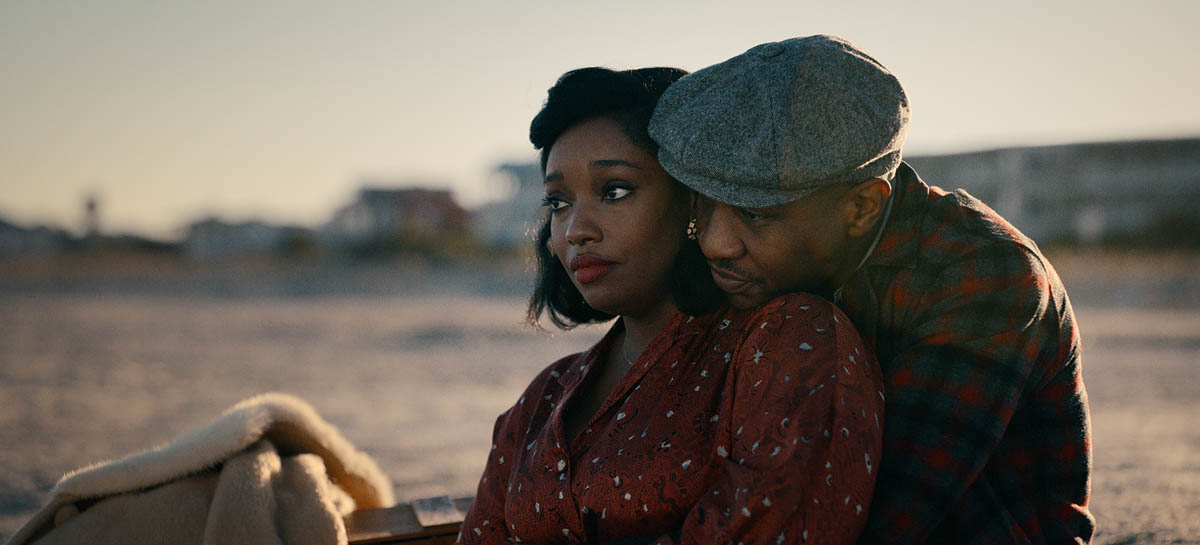 FOX: One of the issues I sometimes have with some movies that have way too much action is that you don't seem to have enough time in developing the characters and developing the relationships between the different characters. Russell actually did a calculation and we were, I think something in the area of 40% action and 60%, drama.
FOX: One of the issues I sometimes have with some movies that have way too much action is that you don't seem to have enough time in developing the characters and developing the relationships between the different characters. Russell actually did a calculation and we were, I think something in the area of 40% action and 60%, drama.
I think when you get to that 50% range and beyond is when you start to feel it in terms of the story, you don't feel the characters. Some of them are very just surface because you don't have any time to do it.
Action is very exciting. but it gets old really quick unless you care about the characters. If you don't have that relationship, and God forbid something bad happens - if you've not established that person - when that bad thing happens, it feels like, “Oh, that's too bad.”
I was really familiar with that when I did Band of Brothers because the title of the story is about the relationship, and if you look at Devotion, what is devotion? It's the relationship between Jesse, his love of aviation, his respect for the military, and his relationship with his and his daughter.
It's varying forms of devotion. When I first started the project, I had heard of the book, but I had not read it at that time. I said to myself, “Is this gonna be religious?” One could say it is, to a certain extent.
It's the devotion to something. You have to have the time - you're talking about those scenes around the table: the kitchen table with Daisy and Jesse, or the scene with Daisy and Tom where she says, “Can you do me a favor?” It's the Daisy character. She is the person that almost steers the drama and the emotion of the whole story.
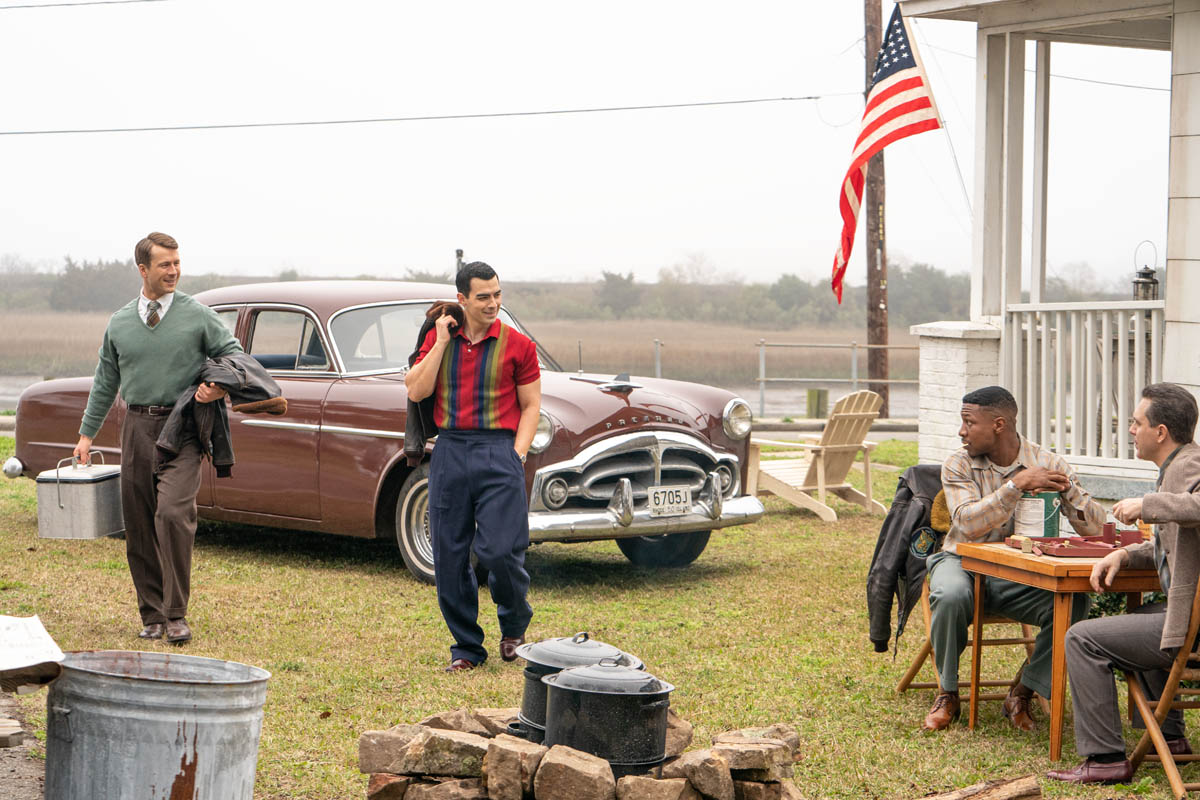 Does that help you to have that figured out, that she's directing the action? What is that doing for you?
Does that help you to have that figured out, that she's directing the action? What is that doing for you?
FOX: It definitely does. It's not just the two guys, which so much of it is, but she's the one that really does. To me, every scene that she's in is just amazing. That scene at the end with her and Tom in Washington, where he comes over and sits with her. Wow.
Yeah. That's a killer scene. It actually starts off like that. Tom figures out the importance of her character, when they're flying together, right? And they make the pass and he thinks, “Wait a minute. Why are we flying over here?” He figures it out. It's all about her. I love it.Let’s talk about the pilots learning the widowmaker sequence with training voiceover.
FOX: Oh, that's a fun scene.
That scene, it's a montage thing that starts with Jesse studying and then Tom studying over there. That scene went in nine different directions.
Then JD came up with this idea of some actual training footage that we had with planes. Actually it was training footage of “How do you operate your Corsair?” and “How do you change this oil?” and “How do you adjust this?” But the thing that was so wonderful was that guy's voice. It was just the classic instructional video kind of voice. And I said, “JD, we're never going to ADR this. You can try, but you will not get this.” I think he did try and he didn't get it. This is the real deal.
I don't even think the original intent was to put that audio in it. We were just trying different ways and we had many different versions. When that one hit and JD came up with this idea to use that audio and then recut it, I said, “Oh my God, this is great.”
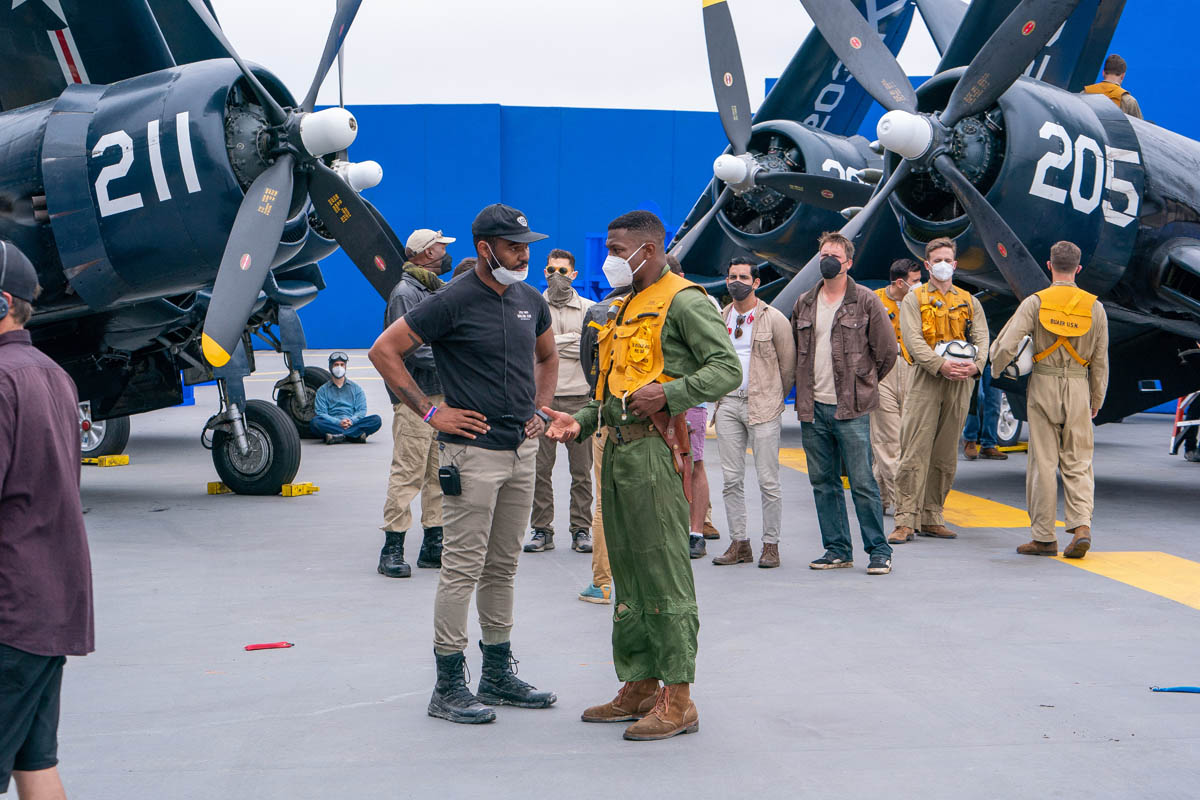 What were some of the reasons why the other ways that you tried to put that sequence together changed?
What were some of the reasons why the other ways that you tried to put that sequence together changed?
FOX: Some of 'em were really good. I think that a couple of times they said, “Oh, we're gonna not use that.” Oh I really liked what we had done, but when we hit this, you saw that this was the better way to attack it. It's just a process.
I work with Craig Brewer a lot and he's notorious for you have something cut to music, it looks fantastic and you think it's so great. And then he says, “I have an idea. Let's try it with this piece of music and recut the whole thing.” And I go, “Oh no, I really like this.” Of course, he's always right and it's better.
I love that idea - how you deal with notes - because of course there's always great reticence to change something, especially if you think it's good, right? If you're on the right track and somebody says, “Let's do something different.” It's interesting how often they're right.FOX: So often they're right. Occasionally you like the old version a little more. Occasionally your assistant will come in and say, “I like the way it was before.” But most of the time, almost all the time, they're better.
The whole process is you're getting to know the characters, and particularly for an editor who's come in quasi-late, they've been living with it forever. They know the characters, they know all of the backstory and all of the stuff, that as an editor, you start cutting it and of course you've read the script and maybe you've read a number of times, but you really don't know the characters.
But as you travel down the road, there are many times where you'll go to a director and you'll say, “This scene that I cut six months ago, I know this character so much better. I would like to recut it. I would like just the timing of it.” Or I just go ahead and do it and then show the director.
And he says, “Oh yeah, that's a lot better.”
It's that catch up. It takes me a while to get it into my bloodstream.
My wife puts it this way: You're always searching for the heartbeat. Once you find it and you've got the heartbeat working really well, and then maybe when the studio gets involved or you're going to previews, it turns into you're not looking for the heartbeat. You're trying to save the heartbeat. You're trying to preserve the heartbeat because through the changes that happen down the road, all of a sudden things that were working before start to get sideways.
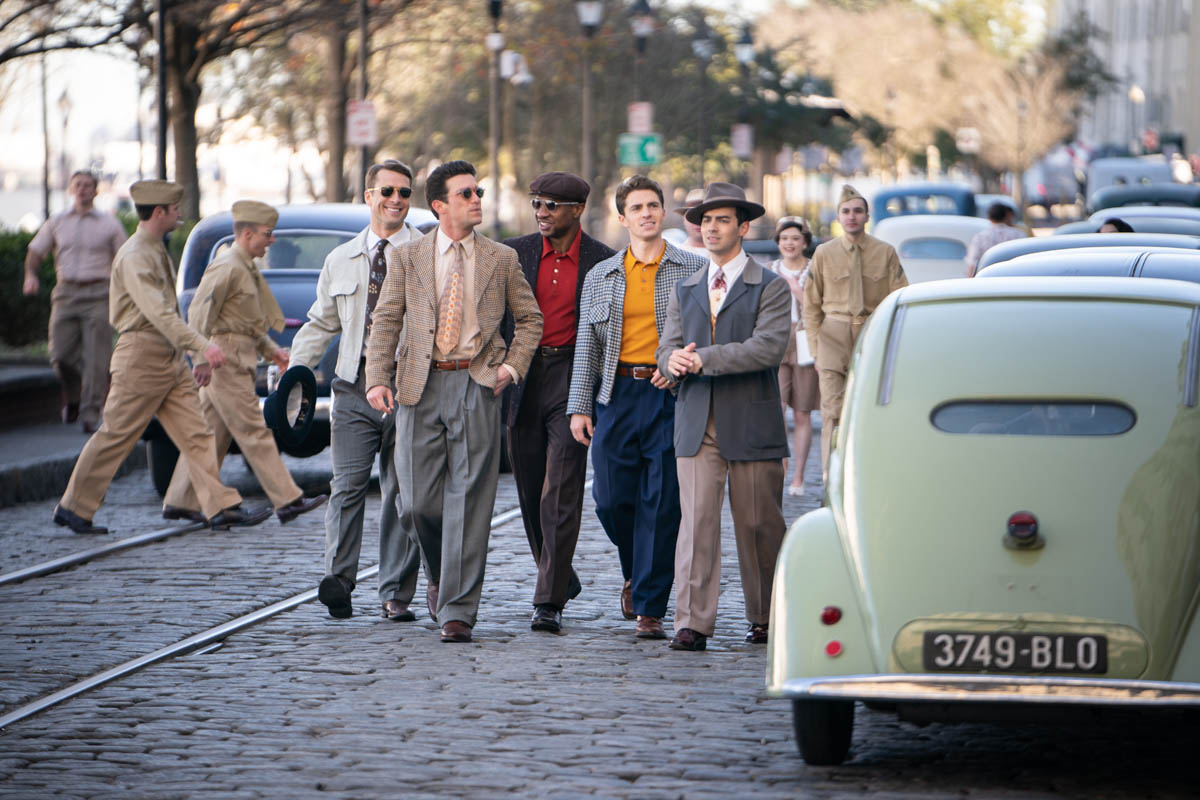 One of the things to talk about is how long to be in something. This probably changed as you went through, but take something like the casino sequence. They go to Korea and they're in a casino for a while, and it's a great sequence and I was happy to be in the casino sequence, but I would guess that you could expand that or contract it fairly much if you wanted to. So what tells you that we're in the casino sequence for the right amount of time?
One of the things to talk about is how long to be in something. This probably changed as you went through, but take something like the casino sequence. They go to Korea and they're in a casino for a while, and it's a great sequence and I was happy to be in the casino sequence, but I would guess that you could expand that or contract it fairly much if you wanted to. So what tells you that we're in the casino sequence for the right amount of time?
FOX: There’s very little of the casino sequence - from the very beginning, when he is walking down the beach and he runs into Elizabeth Taylor, all the way to the end of the fight - that was lifted. I thought a couple of beats in the story could have gone, but it ended up that nothing was lifted. We did some line lifting in certain parts, but for the most part there was very little lifted from that whole sequence. The interesting thing is I like that sequence a lot. I think it's great, it's fun, but it's fine. In the previews, everyone says, “that's our favorite sequence.”
It's sexy and it's fun and it also gives you a little lift. Talk about that: You've got these heavy moments and you've got a story that can go scary or dark or sad. But you've got places that lifts the story up, gets the audience to be able to put a smile on their face for a minute. Talk about the value of that.FOX: If you've come out of an intense moment, you have to give yourself the breath before you come into a lighter moment. So you have to build either in a series of shots or slow it back down a little, so that you can then go into it. It's a rhythm thing.
It's the old “hit the gas, hit the brakes,” and when to do it and when you're coming up to it, to prepare for it so that it doesn't feel jarring because sometimes you need that breath, you need that moment to just be able to catch your breath and even think about what you had just seen rather than quickly go into it.
Briefing the Marines about the attack and when to be on the guy giving the briefing compared to the reactions. I'm always interested when you go to a reaction, so there's a guy up there and he's explaining the mission. How much of that has to play on him and how much are you going, “I know I've got this great shot of him thinking or him thinking.” When are you doing those reactions? Why?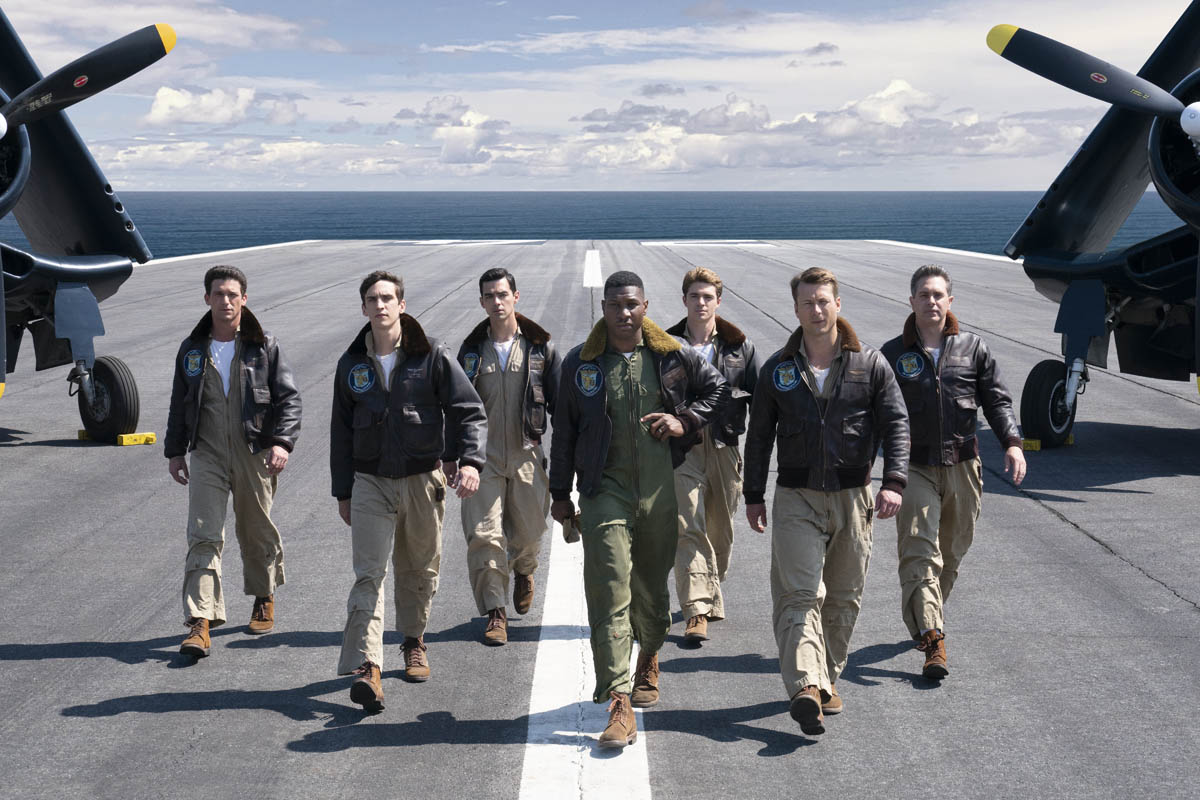 FOX: Most of the time on a scene like that, if you have the footage of people's reactions that are strong, I think that to hear the words and see the words affecting people who are watching is more powerful than being on the person. So I would look at a scene like that and rough it out even by literally cutting black before I find the shots that I necessarily want to put in there.
FOX: Most of the time on a scene like that, if you have the footage of people's reactions that are strong, I think that to hear the words and see the words affecting people who are watching is more powerful than being on the person. So I would look at a scene like that and rough it out even by literally cutting black before I find the shots that I necessarily want to put in there.
Now when it comes to “do I want to be on Cevoli or do I want to be on other people?” Sometimes you don’t have the footage. I think in one of those scenes when they were in the meeting room, there was lots of wonderful footage. When they were in the hangar area, there wasn’t a lot of great footage. There was some. I think that was a case where I had to be on Cevoli a little longer than I wanted, but it worked out fine. I love that time. I also love people smoking. It’s always a wonderful thing - how to use it, but not call attention to it - that adds an interesting flavor.
I was just talking to Lee Smith about this idea of being on someone and being off someone and how the information they're giving you lands differently. For example, if the leader is telling you, “If we aren't at this point at three o'clock, everybody dies.” Do you have to be on the guy saying that?FOX: Yeah. You do have to tread very carefully because if it's highly pertinent information and you really want it to drive home, then yeah, you definitely have to be on them. It takes away from it a little. If it's just talk before, if it's not as completely pertinent, then you can be off of them. But yes, you have to be very careful.
I was looking at a scene from a friend of mine who was cutting something, and they were off the person speaking at just the one time I had seen it. I said to them, “Don't you think that's important to be on them?” Then it has more impact.
Lee talked about doing some film doctoring on movies that he came onto, he said, “I didn't even remember that that piece of information happened in the scene because it was on a reaction.” As soon as you put the important information on the person speaking, then everybody remembers it.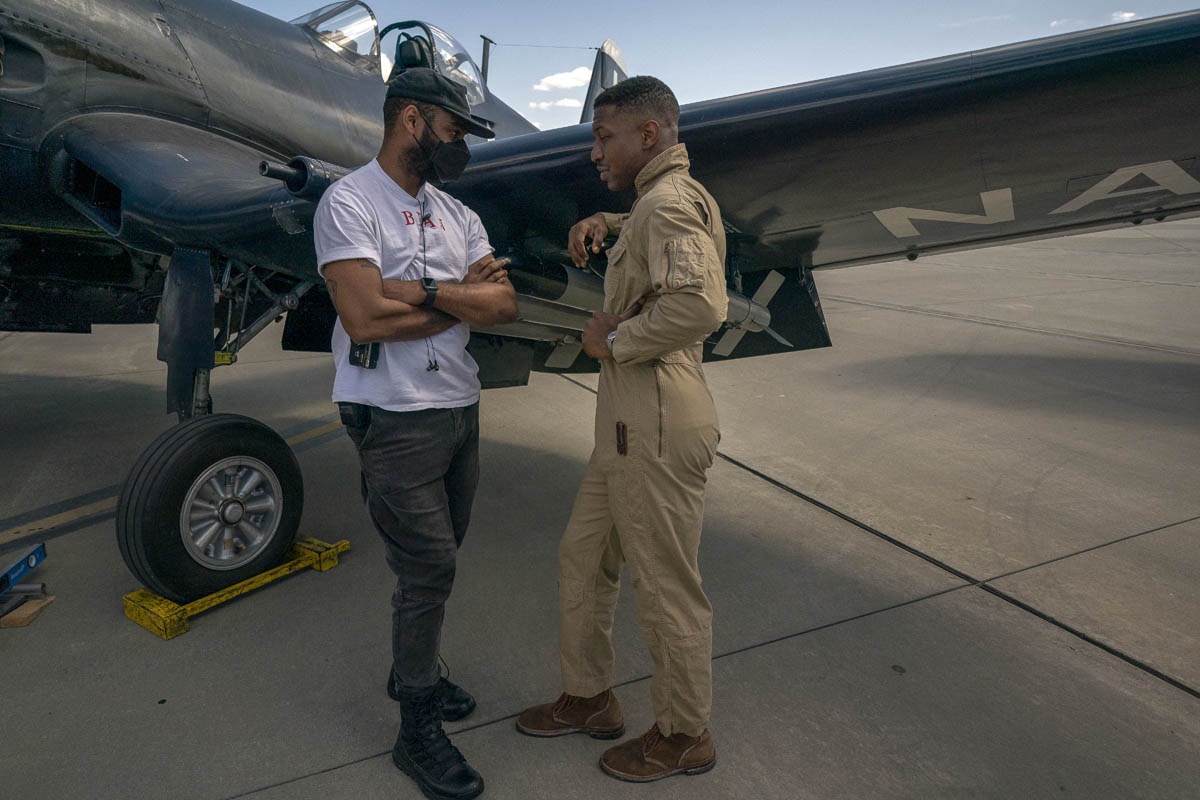 FOX: You know what it is, it's almost like how I cut motivational cutting in that - when you can do it - if someone starts to talk and you wait for them to bring their head around and let that then takes you to that person, it makes it more important. It also adds to a certain degree of the continuity and geography of the room. Sometimes you can't. Sometimes they wait too long before they move their head, or there's a million games you can play, but the film tells you where to cut.
FOX: You know what it is, it's almost like how I cut motivational cutting in that - when you can do it - if someone starts to talk and you wait for them to bring their head around and let that then takes you to that person, it makes it more important. It also adds to a certain degree of the continuity and geography of the room. Sometimes you can't. Sometimes they wait too long before they move their head, or there's a million games you can play, but the film tells you where to cut.
You would love to say that it's all because the editor's so great. I think the film tells you where to cut now. You don't always get it to work out the way you want. You say, “God, I sure wished I could have cut earlier, but it didn't work out that way.” The film tells you where to cut.
But the editor has to be able to hear when the film tells you when to cut.FOX: Yeah, exactly.
Let's talk about sound design as part of rhythm. There's a pace and a rhythm that you're trying to cut, but sound is really a big part of that. Talk to me about that in a battle scene or a fight scene.FOX: Sound is 49% of the cut. I believe wholeheartedly that the sound design - and not sound design, like “What does it sound like?” - but the rhythms of what's happening and when certain things are happening that a sound effect happens, could be a door close, it could be in anything, but when it happens at a certain word, it punctuates. You can use those kinds of things.
But I use sound on a lot of different weird levels, especially when I'm cutting a scene and I'm just so lost in the weeds. When I want to clear my head of it, I peel into sound for an hour and I start just building some beds and starting to play with some big stroke sounds that just fill the room a little bit and give it a quality that you feel like it's real. I don't get into artifacts, I don't get into replacing door closes or doing anything like that, but just for a while, I get away from the cut.
Then I go back into the cut, and now things just feel a little more real. And then I start playing with the cut and moving things around in a replacing takes. And then I go back into sound again. So it becomes this thing where it goes editorial and then sound, and then editorial, and then sound and then sometimes then I'll move into music.
So it'll be way towards the end where it's editing sound, and then I start chasing up with it with music.
Love it. Talk to me about the MIG edit in the canyon.FOX: JD was just so great because he had an answer for everything, and most good directors always do.
That’s most of their job, right? It’s just answering questions.FOX: A little bit, yeah. It's great when they know the answer.
For example, the story of Tom going down another canyon, with the MiG and that one Corsair - and those were real - where Tom’s plane peels off one way, and then the MiG follows Jesse going another way. So they’re going in opposite directions, and then coming around to a center point. That was a scene we messed around with for a long time.
I had a million questions for JD - “Wouldn’t a MiG catch up?” JD says, “The problem is that because the MiG is so much faster, it has to slow down so far that it becomes almost unsafe.”You would think that of course the MiG should be able to take it. But JD says, “No. It doesn’t work that way.”
When I’m cutting it initially, I don't really have JD to really ask these questions. I could call him and he'd call me back so I'm trying to figure it out. That scene was hard. To have it all come together, at that right moment was really great.
You said, “I could have called him to get the answer.” Isn't there something in your head saying, “I cannot constantly pester my director?”FOX: I'm talking about the jigsaw puzzle of trying to figure out the logic of things: why does this happen and why doesn't this happen over here? Then you start looking at the footage and you say, “Oh, I see it's coming around that corner. Oh, now I've gotta go back and re-edit this.” There are instances where there are scenes that are so complex that, I'll call the director and say, “I really think you and I should just cut this together because I know you and I will nail it faster.”
Here's a question for you about intercutting. There's stuff going on up in the air, and we also have another storyline of guys in the trenches. Was that edited as it was scripted, or did you find you needed to manipulate the intercutting of the two stories?FOX: It was pretty much storyboarded and or scripted largely. Now, we would cheat and we would add an extra beat or that kind of thing, depending on the performance.
At a certain point you say, “It's time that they save them. We need to collapse those two more beats and let's just go to it because it feels like we're milking it too much.” When you've got all the great footage and you've got the music crescendoing and everything, it's time to go.
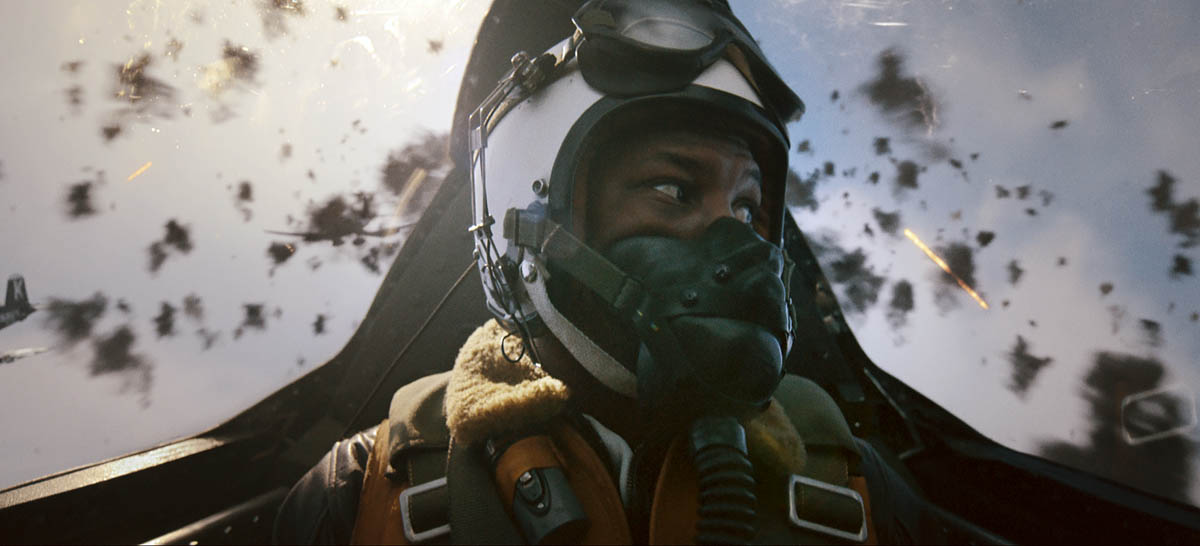 I don't want to do a spoiler, even though the movie's been out for a while. But essentially , a big climactic thing happens and then the movie goes on for a little while longer. Is there a clock ticking in your head? What are you thinking after that point where you're thinking, “How long is the audience gonna stay with me before we wrap this up?”
I don't want to do a spoiler, even though the movie's been out for a while. But essentially , a big climactic thing happens and then the movie goes on for a little while longer. Is there a clock ticking in your head? What are you thinking after that point where you're thinking, “How long is the audience gonna stay with me before we wrap this up?”
FOX: There was a side of me that thought maybe we should get out a little earlier, or we should have not ended it necessarily ended it any differently, but maybe we should cut some of the inbetween. But JD felt very passionate about his strong belief of being true to the real story and being respectful to the family. They were involved. They were seeing cuts, they were looking at it, and they were very pleased with the final decisions.
Directors love those longer drawn Lord of the Rings ending, where you have an end, and then another ending, and another ending. I think that sometimes they're great because you almost don't want the movie to end because you're enjoying it.
You mentioned earlier that you had not read the book, but that you did at some point. At what point did you read the book, and why did you feel like you needed to?FOX: I didn't think I finished it either. I thought it would've been helpful. So I started the book and then at a certain point, I just became so overwhelmed with dailies and the daily requirements of getting stuff done, that I just lost sight of it. Maybe someday I'll finish it. It'll be interesting actually.
Sometimes people want to read the book. You were probably the editor that they wanted to have, and you didn't have to worry about landing the job, but sometimes people say, “Oh, for the interview with the director, I wanna make sure I read the book.”FOX: That's a good point. No, I had done another film for the same company, Black Label, and it was Only the Brave and they had given me a call and said, “Are you interested in doing this?” So I read the script and I said, “Oh my God, this would be great.” I had met JD once a couple years before.
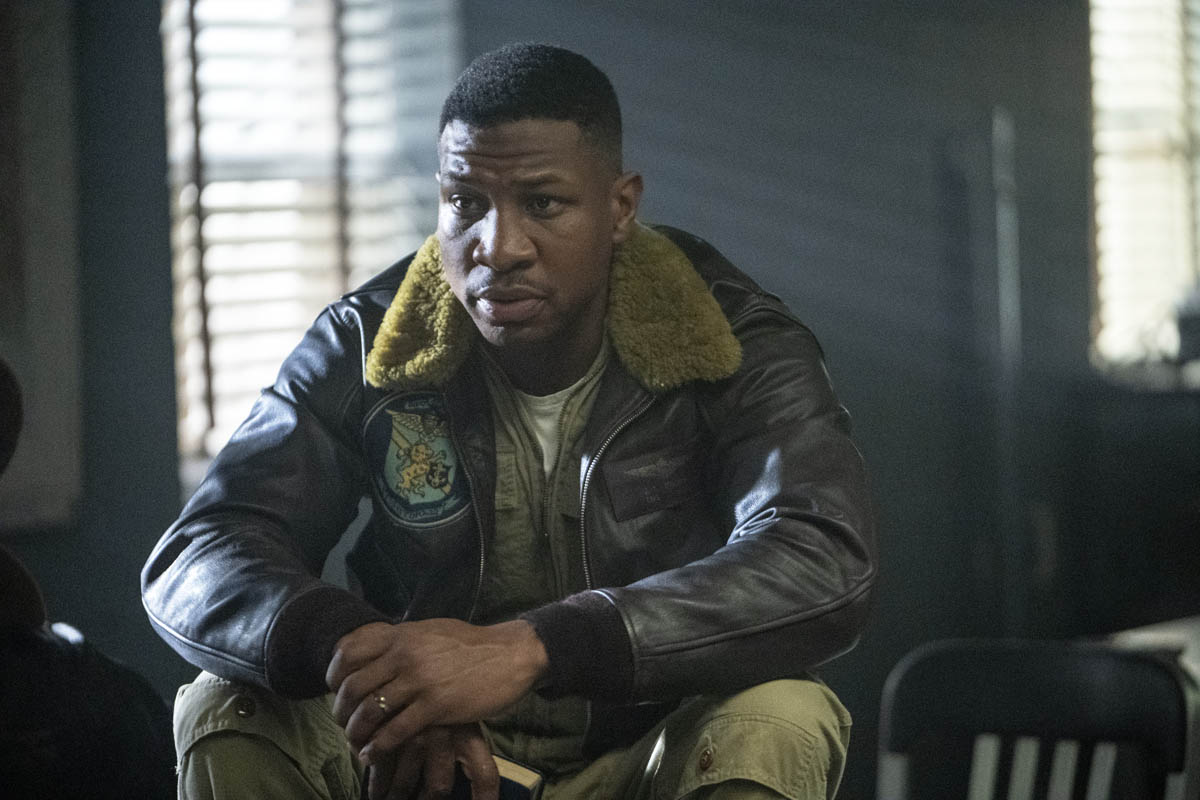 Some people will say, I don't want this source material in my head.
Some people will say, I don't want this source material in my head.
FOX: Absolutely. Sometimes I don't even like to go on set. I don't want to see that it's only a set.
Was there a favorite scene or a most difficult scene for you to cut?FOX: One of my absolute favorite scenes is the beach scene before he goes off to war. The characters are just so great and with the daughter playing in front, the emotion, it's just so real. She won't see him again. Granted that's not the moment that he shipped off, but that was the end. I love that one.
In terms of difficulty, that whole setup of those shots at the end of the movie was just so amazing. JD often said we have to be careful because we have so many gorgeous shots that we can’t make this aerial candy. We have to be very selective. Not to say that you can't use a beautiful shot. You have to look for a shot that maybe has more edge to it, but at the same time, don't fall in love with the shots too much. Don't make them so gorgeous.
You've got a story to tell and the story's more important visuals.FOX: That sequence that you were talking about with the announcer talking, if I could, I would've made it twice as long. But you want people to want more.
Or that first time that they flew. When they're going down the beach with all those amazing shots, there were like five shots and it was very painful.
Just to get it a little tighter -FOX: -Yeah, we just saw three other gorgeous shots, and said, “That's a great shot but that'll be for the return to Devotion.”
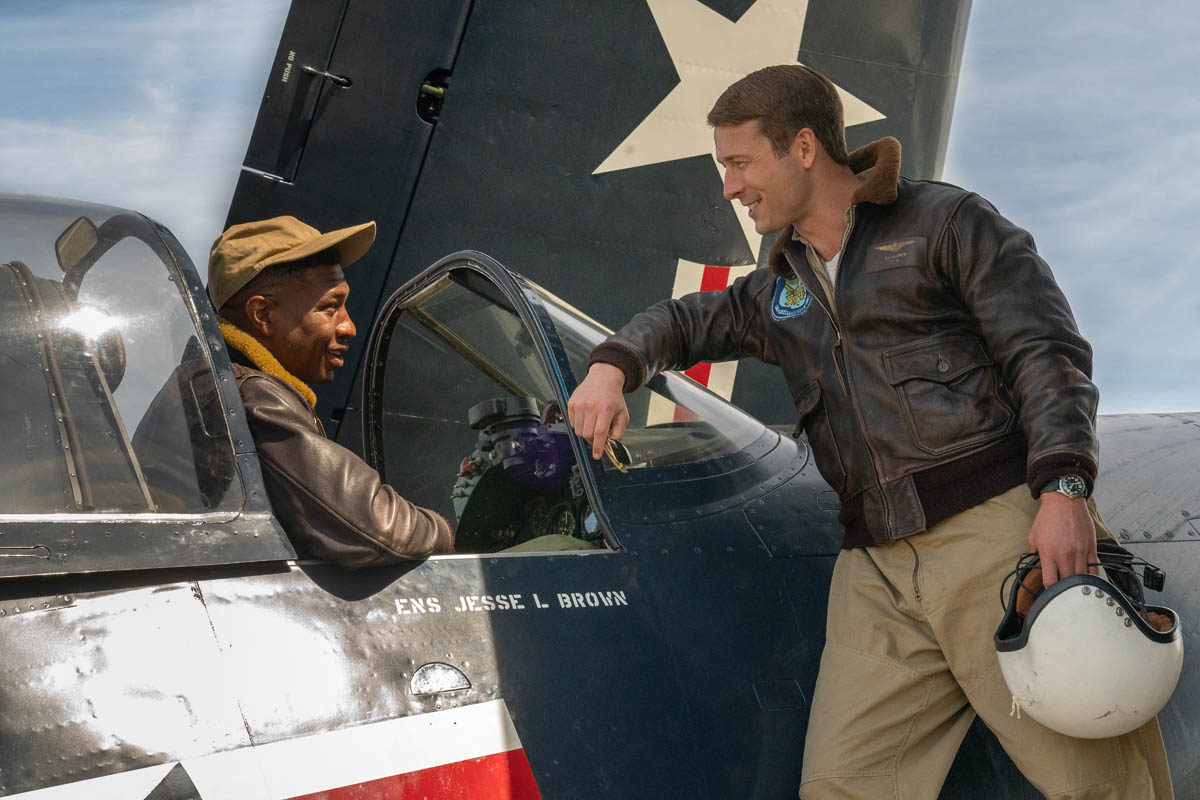 I'm assuming you have an agent, but so often the projects are coming to you without the need of the agent. Talk to me about the value of an agent.
I'm assuming you have an agent, but so often the projects are coming to you without the need of the agent. Talk to me about the value of an agent.
FOX: I've been doing this a long time and I have relationships with directors and with studios and with producers. But simultaneously, if I look at the work that I do, a percentage of it is through previous relationships, but a number of them come through my agent and my agent knows exactly what I like and knows the types of projects that interest me.
My agent will hear about a project way in the embryonic stage when it's a year away from shooting and is able to set up that interview. So there's that. It makes a big difference because I'm working, I don't have time to be looking for the next project.
And yes, so-and-so could call me and say, “Hey, what are you doing?” But sometimes, you need someone else looking for other projects or new directors that you haven't worked with before or different studios. There’s a whole business side, with negotiating your deal before you start the job. It does all fall into place but there’s always something, and agents are totally involved in dealing with the studio.
It's a very valuable asset. I think it helps expand the people you work with, hearing things that you would have not heard about. They also were the ones that received the phone calls of, “Hey, we're starting this show we're looking for…” How would you know? They could call you, but I don't get a lot of cold calls from people that I've never worked with before.
I was thinking more of the relationships you've already built. You know that you don't need that guy to get you this job, but there's so much more that he's doing. The negotiating is part of it, right? That's the good cop, bad cop thing. It's that he knows the going prices, that kind of thing.FOX: I didn't have an agent for a very long time. But I also knew that at a certain point it was going to be necessary.
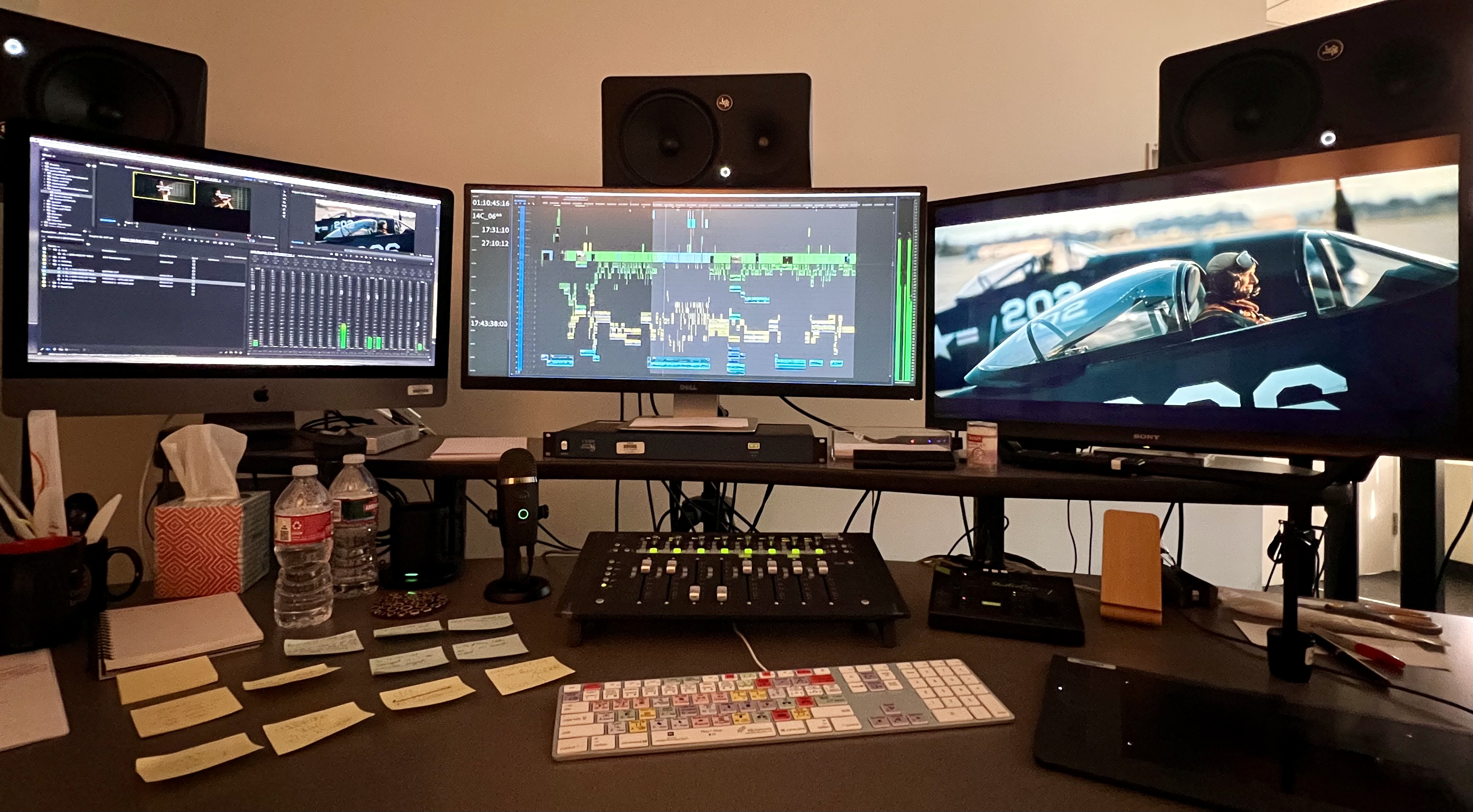 Billy Fox's editing set-up at FOTOKEM, using Adobe Premiere Pro to edit "Devotion"
Billy Fox's editing set-up at FOTOKEM, using Adobe Premiere Pro to edit "Devotion"
FOX: No, I came from a television background working at a television station down in San Diego. A gentleman in San Diego had a commercial production company. He decided to put in editorial. He used to rent space at the station to edit his commercials, and I would work with him.
Then he decided to put in his own facility, his own edit room, and he hired me to build the room and also cut. So that was one of my very first things, and I did that for a number of years. Then I saw opportunities up in Los Angeles.
Was that TV cutting? Video like ¾ beta, Digibeta. 1 inch?FOX: It was all of that. And it was 2 inch. When I was first starting, I was, working on Ampex 2000s AVR-1s. I was involved with all of those formats. When I first moved to LA I worked for NBC News and NBC Sports and NBC Promotion.
They're separate companies, so to speak. But I would be hired and I would be moved around at NBC and I was there for a while. Had a ball. Just had a great time. Then I just saw an opportunity, because I really wanted to do drama. But at that time, all drama, be it television or feature, was all done in film.
I was in electronic, but I went all over the place to do music videos and specials - comedies and varying things. There was a river between electronic and film, and how do you get over there?
Slowly but surely the river just disappeared and they started looking at people who had an electronic understanding because - on at least a post-production level - that was the way it was going. So the somewhat negative thing of being an electronic edit became an asset rather than a negative.
How did you make your jump to your first narrative project?FOX: It's just hearing things. I was working through an edit facility, and they were going to be editing an, ABC afterschool special. They hadn't picked an editor and I got the gig. I don't even know how I got it.
I remember because I was my own assistant. It is one of the things that's interesting about the old world of editorial in the film world, you had an editor, but you had assistants who were in the room with that editor - and they're of course taking the dailies and they're logging them and doing all of that heavy lifting - but simultaneously they get to be in the room and watch how an editor processes their dailies and how the process happens.
Being that I was my own assistant. I remember starting to cut this and I thought, “I have no idea what I'm doing.” I have no idea if this is a good way to do it or a bad way to do it, because I had no point of reference.
I think it could be argued even today, I don't know if I'm a fast editor or a slow editor because I'm never in a room with another editor.
Yeah. Most of us aren't.FOX: I don't know if my technique is good or bad. I've complained about it once to a director, and he says, “It works. I like how you cut, you get it done, it's fine. Don't worry about it.”
Did you cut that after-school special in video editing?FOX: That was on a CMX 3400 on ¾ inch that we would master it. We would do an online later, but it was 3/4inch
As always, I loved our conversation.FOX: Absolutely.
